Anatomy of an Album Leak – How They Happen, the Impacts, and What Should Be Done About Leaks
PeteHatesMusic on Twitter: @PeteHatesMusic
You’re a musician. You work hard on an album. It leaks to the Internet ahead of its scheduled release. Do you cancel your celebrations and go ballistic, or simply shrug? If you’re Simon Cowell, you call the police.
It’s typically viewed as a lose-lose situation for all the players involved in an album leak (except maybe the anxious listener) . Whether you’re an artist, a record label, or a retailer, you never want to see an album leak days or even weeks in advance. If you’re an Internet torrent user or belong to an online downloading group, then leaking it early will bring you “mad cred” (a term that’s surely in the Oxford English Dictionary)
Ways an Album Can Leak
Despite everyone’s apparent best efforts, virtually every album will leak. But just how does an album leak? Well, I’m glad you asked.
The first place it can leak is in the recording studio. You have producers, engineers, and disgruntled groupies all hanging around, working with demo or master copies of the music. Artists are often emailing tracks to all sorts of people, and it’s not THAT hard to get an email intercepted or a computer hacked these days – just ask my psycho ex-girlfriends. This is why so many unfinished tracks make it to the web. When an album is completed, the labels get the finished product, and some mail room punk or temp assistant might leak it to the Interwebs.
The press often gets an advanced copy of an album, to start the buzz. When they get an advanced copy, sometimes so does the Internet, as the so-called watermarks to trace the culprit of any leaks often prove ineffective. The production plant and the distribution can also yield ten fingers that might snatch an early CD and give it to the cool kids on the net.
Heck, sometimes bands even leak albums themselves, to rebel against their record label. Death Grips released their debut album in April 2012. They wanted a quick follow up later that year. Epic Records wanted a 2013 release. Rather than work it out, Death Grips ‘leaked’ the album to the Internet, and promptly lost their record deal with Epic.
M.I.A. also threatened the same thing in July 2013. She didn’t like the speed at which Interscope was moving and said she was going to leak the album herself. Instead of a leak, she generated free press about her new album.
If interscope takes longer i can always leak this next week and make a new one by the time they are ready.
— M.I.A (@MIAuniverse) August 9, 2013
For their Maladroit album, Weezer put up demos of the mp3s on their website every day while working on the music. This meant that there were dozens of copies of up to 30 songs floating around the internet, with people unsure what songs would make the album and which songs would be completed. Oddly, radio stations played these demos, many of which were technically unreleased. Enter the record label, Geffen Records. They ordered Weezer to return the master tapes from the Maladroit recording sessions, in an effort to thwart any further reduction of impending album sales. Instead, Weezer wrote kitschy songs to help album sales.
Some Famous Album Leaks (Hint: Almost Every Band You Can Name)
You can pretty much name any big artist and they’ve had an album leak in advance of its sale date. Somewhat recently, it was Kanye West and his Yeezus album (and even his music video for Black Skinhead leaked ahead of time). A$AP Rocky’s LongLiveA$AP leaked a month early. The White Stripes album Icky Thump leaked 20 days early. U2’s 2004 album How to Dismantle An Atomic Bomb was on illegal downloading sites ahead of its release. Both Big Boi and Drake have fallen victim to leaks in recent years. Surprisingly, people even want the Nickelback album ahead of its street date. The list is very long – basically, everyone has been a victim of this.
What might be worse than having your new album or single leak is having an unfinished demo leak. An artist might be testing out a new sound or working towards something great, only to have their heart ripped out by someone leaking their track to the net. Again, it happens to the best of them.
An unmastered version of Radiohead’s Hail to the Thief album made its way to the Internet about ten weeks early. The band pleaded with fans not to listen, noting that it is not the complete and final version. No one believed this, nor did they care – the album spread rapidly across the Internet. When the album was actually properly finished, Radiohead didn’t want this to leak, either. To try and stop a proper album leak happening from the media, the band sent journalists the album sealed shut inside individual CD players that couldn’t be opened. The band is apparently unaware of recording devices.
As Oasis prepared for their Dig Out Your Soul album, several songs began appearing online. It turns out they were old demos, two of which later on ended up on Noel Gallagher’s 2011 solo debut album. All 11 songs on another Oasis album, Heathen Chemistry, leaked a massive three months in advance. However, the final versions of Little By Little and Better Man differed from that of the early leak, showing that it was an unmastered version that made it to the net.
In April 2013, Jai Paul’s anticipated debut album landed on music site Bandcamp and was up for sale, to the surprise and delight of fans of the early singles. The problem was, Jai Paul hadn’t put his album up for sale – someone had illegally gotten ahold of it and was posing as Jai Paul, and perhaps even worse, was collecting profits from his work.
How Artists React to Leaks
Jay-Z’s Blueprint 3 leaked around August 31, 2009, ahead of its scheduled September 11 date. The album was moved up to September 8 and still hit number 1 on the Billboard charts. Jay-Z played the “I’m cool with the leak” card, by saying “It’s a preview. I’m excited for people to hear the album. I’m very proud of the work I’ve done, so enjoy it.”
This is a far cry from how he reacted in the past. Jay-Z was sentenced to three years of probation for stabbing a record executive in December 1999, following bootlegging of his album, Vol. 3… Life and Times of S. Carter. The attack happened at a New York City night club album release party for (ex-A Tribe Called Quest frontman) Q-Tip’s solo debut CD, Amplified, which hopefully didn’t leak, too.
Lil Wayne got creative when tracks from his Tha Carter III album leaked early, by making a mixtape called, yup, The Leak. He recovered by letting those leaked tracks go, and recorded new tracks to combat the leak. Did the previous leak affect album sales? How does one million albums sold in week 1 sound?
Kaiser Chiefs’ Nick Hodgson felt as if he had been burgled, as he wrote in a blog piece for Drowned in Sound. “About three weeks prior to its release, our album got leaked. A gloom came over me when I saw it available on blogs all across the globe. It has nothing to do with money, that doesn’t come into it, but it felt like someone had come into my house and nicked stuff (then put it on the internet for everyone to have a look at). Amazingly, some of the people who blogged our leaked album signed off with ‘I appreciate comments and thank yous’, as though they were providing a legitimate service.”
Half Moon Run are a Canadian indie band, recently championed by Hew Stephens at BBC (and their song Full Circle cracked our top songs of 2012 list). On illegal torrent site The Pirate Bay, a comment under their album Dark Eyes reads “this is my band haha…”.
When I asked the band about it on Twitter, they cryptically responded.
@PeteHatesMusic haha maybe
— half moon run (@halfmoonrun) August 28, 2013
It is funny and insightful all the same – artists searching for their own material on illegal download sites. At least it didn’t leak.
When Drake’s Thank Me Later leaked online, he didn’t get mad, but merely noted how he used to give away mixtapes for free in the past.
I gave away free music for years so we're good over here…just allow it to be the soundtrack to your summer and ENJOY! JUNE 15th!
— Drizzy (@Drake) June 2, 2010
Effects of Leaks on Album Sales
With the knowledge of how albums typically leak and how artists react to leaks, possibly the most important question of all is “what is the effect of leaks on album sales?” Well, that depends on who you ask.
A 2012 study showed that illegal downloading actually helps album sales. The thorough study is by an assistant professor at North Carolina State University, Robert G. Hammond. The report, entitled Profit Leak? Pre-Release File Sharing and the Music Industry, looks at album leaking and its effects in detail.
Using data from an exclusive file sharing website that allows users to share music files using the BitTorrent protocol, Hammond concludes that “an album benefits from increased file sharing: an album that became available in file-sharing networks one month earlier would sell 60 additional units.” I guess artists can go ahead about buy that yacht they always wanted.
Separate from album leaking, Hammond notes that file sharing benefits mainstream pop albums more than indie music, and that the effects of file sharing are double for acts who have sold over 100,000 copies versus acts that have not. The paper claims to be the first to study music album leaks, so clearly further studies and sample sizes are needed, but the results might surprise some people.
So people that buy albums do exist! Media website PMunWIRED.com took a poll of readers, and asked “How likely are you to buy music after it has been leaked?” 80% of respondents said it depends how they feel about the artist. 20% said it didn’t make sense to buy music that they could get for free. Generally, it seems if an album is good and worth having, people will pay for it.
When asked by me his thoughts of the impact of leaks on sales, Drowned in Sound founder Sean Adams noted that “Maybe the impact of leaks is not as much as it was in the P2P (peer to peer) era pre-Spotify, as the major streaming services which have had as big an impact on piracy as they have had on sales. Then again, with album premieres on the Guardian, NPR and Pitchfolk Advance, a lot of albums are being leaked by the labels as a marketing tool. I’m not sure this listening booth experience that had become an endless parade of new releases, is really generating sales and it’s certainly not bringing in enough royalties to bring things back to the glory days of the CD-era.”
Despite a high-profile internet leak ten weeks before its release (mentioned earlier in this article), Radiohead’s Hail to the Thief debuted at number one in the United Kingdom and number three in the United States. Also mentioned earlier, The White Stripes album Icky Thump leaked 20 days early, but still hit number 2 in the States and number 1 in the UK. For the big artists, leaks might impact overall sales numbers, but don’t seem to impact chart position or put any upcoming tours in jeopardy.

Is this music piracy, too?! (Source: http://www.flickr.com/photos/72213316@N00/2592113449/sizes/m/in/photostream/
Are big bands the only ones who might see a small benefit from illegal downloading and leaks? For small bands, their albums typically don’t leak ahead of their release dates, as no one really knows who they are. However, often the important thing is to get your music to the masses and to fill music venues, and if free sharing (and legal streaming) is the only means, many artists are okay with this.
Toronto radio legend Alan Cross, formerly of Corus Radio / Edge 102, and presently the ‘Guidance Counsellor’ at new Toronto station Indie 88 told me that “maybe the best things smaller bands can do is live with the fact that there’s inevitably going to be some digital spillage and adjust their revenue projections accordingly.”
How Artists and Labels are Combating Leaks
Sometimes, blind faith in the purchasing public isn’t enough. Artists and, more importantly, labels want to ensure a return on their investment. Since an album is available illegally on the Internet right now, labels will move up the release date of an album by a few days or a week – sometimes more – to get the songs into the hands of the paying public. Labels also try to entice fans to purchase an album by bundling it with exclusives, such as bonus tracks, artwork, concert tickets, and contests. Artists and labels need to both find a new way to make money and combat album leaks, since album leaking and downloading aren’t going anywhere.
If you’re uncertain if an album has leaked, one quick source is the website Has It Leaked. While not hosting any illegal content, the website simply lists if an album has leaked or not. The website has even seized opportunities to help promote bands. When I asked Staffan Ulmert from the site if their invitation to artists/labels on Has It Leaked led to any interesting promotions or contact from the music industry, he cited a very good example with US indie group The Maine.
“Having left Warner they promoted their own album release (in June 2013) with a limited budget, and we got a chance to help them out. We got a massive audience, but we target the people who presumably don’t want to pay for music. Nevertheless we were effectively getting word out there. We even offered their management free ads, because we liked how they went from a big label and dared to use our site to connect with new fans.” Ulmert added, “But they told us they really wanted to pay for it, so their ads ended up covering big portions of the site. The album went to No. 39 on the Billboard 200 selling over 10,000 copies in its first week last month. Pretty cool for an album promoted at a site called Has it Leaked.”
This is a solid example of a new model that bands can embrace and flourish from. The best example in recent years is Radiohead’s In Rainbows release. In 2007, Radiohead famously turned the industry on its head. Without a record label, people were unsure where Radiohead would turn next. At the beginning of October, the band announced their new album In Rainbows would be self-released on their website. The cost? Pay what you want. People both derided and lauded the band for their ambition. They prevented an album leak and made listening to a new album a proper experience once again.
Jay-Z loved what Radiohead did. He also pushed the boundaries with his July 2013 release Magna Carta Holy Grail. The rapper teamed with Samsung Mobile for a new phone app. The first one million users would get the album for free and in advance of the retail world. #newrules as Jay-Z liked to tell everyone.
Not everyone likes what Radiohead did though. Sean Adams compares and contrasts Nine Inch Nails’ Ghosts self-release, which followed Radiohead’s In Rainbows. “Maybe it’s because I’m a fan, but the way Nine Inch Nails’ Ghosts download was part of a shop front to sell a range of premium versions of a release made a lot of sense to me. I’m not sure Radiohead put across much more of a message to much fans other than that “music is free, but donate a bit if you’re feeling guilty” which personally I felt was irresponsible for such a revered band to say that the price point is zero. Music isn’t worthless, and “market leaders” should be doing everything in their power to help set a value norm. I’m not sure there’s really any turning back from that In Rainbows moment, which I personally feel freed a much bigger genie from the bottle than Napster or Spotify.”
And not everyone has the clout of a Radiohead or a Jay-Z though. Sick of seeing his wife be a part of an industry where the artists were having their work stolen, John Fix III and his Cuckoo’s Egg Project decided to do something about it. He decided to frustrate downloaders by flooding the torrent scene with fake songs and files. This meant misnamed songs, looping choruses, and basically not what you were looking for. A friend of mine fell victim to this on file sharing site Kazaa. After getting By The Way by the Red Hot Chili Peppers and throwing it on as background music, my friend exclaimed this was an amazing album. After having a song played for me, I noted that the entire song was the 30 second catchy chorus on repeat, so to the casual listener, it was bound to be good. Another victim of the thwarters.
Earlier this year, Pitchfork outlined this phenomenon in an article about “Radiohead” track, Innocent Civilians – a “new Radiohead song” leaked online that was actually “Some Things Must Go This Way” by the Los Angeles band Paloalto (which is a Radiohead song title). People are so desperate for unreleased and new material, they will suspend belief and download whatever is around. If an album that you haven’t heard of by a band you like is floating around the Internet claiming “New Daft Punk album”, it’s not a leak – it’s a fake.
Paloalto – Some Things Must Go This Way (aka Radiohead’s Innocent Civilians)
Alan Cross figures that “Leaks are a way of life. More albums are leaked than the public knows about. The best you can do is try to prevent them with heavy security and safeguards. If something does escape, you can try to plug the source before the leak is wildly spread. It’s doable, but difficult.”
Sean Adams adds “I think labels have come to accept that it will happen. To combat leaks the best thing they can do is offer streams (which pay an artist a royalty) and ensure pre-release pre-orders are available as early as possible. And that the release itself is something special that fans want to own and treasure.”
And what do labels think? Eric Alper, Director of Media Relations, Licensing and Distribution at eOne Music Canada said to me that he doesn’t “want to reveal at all how we deal with leaks, as that’s pretty confidential, and at the same time, can’t reveal when leaks happen internally as part of the promo plan.” This was a common response that I got when I reached out to labels – you’ve gotta protect your assets.
Another way labels are, or at least were, combating leaks is similar to the Cuckoo’s Egg Project, and involves embroiled company MediaDefender. Like John Fix III’s experimenting, MediaDefender spreads fake files, clogs up downloading queues, as well as disrupts the downloading process in general. While successful for awhile, hackers got to their emails in 2007 and determined their methods in detail to the tech community. It was a PR nightmare for the company, sending its share price spiralling down. But companies like this do exist, despite it seeming like a futile effort.
Although album leaks can be a thorn in the side of labels and bands, sometimes bands do it as part of a campaign. One of the more famous examples in recent years is Nine Inch Nails, who teamed with promotion company 42 Entertainment and purposely left USB sticks in washrooms that contained complete, unreleased tracks from upcoming album, Year Zero. Trent Reznor wanted to start a conversation, and want to see how the leaked music would spread (legally, for once).
There are various rumours about bands leaking songs themselves but denying it. A one-off single, These Are My Twisted Words by Radiohead, appeared on a message board online. It was accompanied by a text file which people interpreted as a clue to a new EP being released called Wall of Ice. The band ending up self-releasing the track for free, as they often do, a few days after this apparent leak. Since they didn’t have a label contract, they can leak anything they want to. Sadly, no EP followed, nor did any complaints of a leak or denial of self-leaking from the band. No one knows for certain what happened.
Radiohead – These Are My Twisted Words
So what about that track by Leona Lewis and Justin Timberlake that made its way to the Internet ahead of its calendar date? Was this more genius PR by Cowell trying to rope in the police, or was it genuine concern? Again, no one is entirely certain (the consensus is a hack), but it got people talking if anything else.
A Society of Instant Gratification
Do music fans and journalists have a moral obligation when it comes to song or album leaks? When a song makes its way onto the Internet and get uploaded to SoundCloud and YouTube, should music websites respect the acts they feature or post it and go after more page views and unique views?
How about radio stations? Chicago’s Q101 angered Jack White by playing leaked songs on their station, and not waiting for legit tracks to be sent to them. The station’s music director, Brett “Spike” Eskin at the time said “Our listeners want to hear new music as soon as it’s available. We’re just reacting to the way it’s becoming available.”
This past Monday morning (September 9), 12 hours before the proper release of the new Arcade Fire track Reflektor, Indie88 in Toronto gave the track a partial spin before being told by Arcade Fire’s label to stop. Is Indie88 crazy to do this or crazy not to do this? What do they say to the band if questioned? If you run a movie theatre, and someone gives you a bootleg copy of Star Wars Episode VII, should you run it a few days before its worldwide release? If NBC gets a hold of a leak of AMC’s Breaking Bad finale, can they start running it before it’s September 22 finale date?
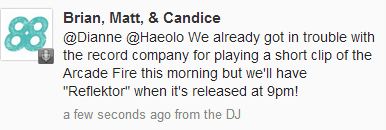
The problem with leaks is that the music is now out of an artist’s hands. Noel Gallagher fell victim to this, and realized it when he was shown a video on YouTube. It was one of his demos from years back – slightly odd but not surprising given what we’ve presented in this article. The surprising thing? In this video and other ones, there were fans completing the demos and making full songs out of his uncompleted work and putting them on YouTube.
This also recently happened with Daft Punk and their intentional slow leak of snippets of their songs from Random Access Memories. The snippets were stitched together and looped, then uploaded to sites as the advanced and definitive version of the new song, when they were not.
This is why music fans fall victim to fake songs and album leaks – we’re a society of instant gratification, and we’ll turn off all logic to get what we want, when we want it – which is two minutes ago. How can an artist win in this new world? How are the media supposed to act in response?
Final Thoughts
In this somewhat new world of online downloads and album leaks, the rules are unwritten. As an artist and a label, how you adapt and embrace this era will define your legacy and existence. Do you fight everyone to do what you think is right (and most profitable)? If you want to stay in the Stone Age with those 28.8 modems, then sure.
But if you begrudging accept we are in a new era, with a generation that has grown up knowing nothing but free and instant music, where release dates mean nothing, then you will realize things have to change. Like the Radioheads, the Jay-Z’s, and the Nine Inch Nails of the new frontier, you have to use leaks to your advantage and take the power back. This will keep your fans engaged, and also help combat leaks.
Some people see leaks as opportunities, other people think it is the worst thing in the world. The answer lies in somewhere in the murky middle. And one thing will always ring truer than anything else – artists need to make good music.
Let me know your thoughts in the comments or on Twitter @PeteHatesMusic
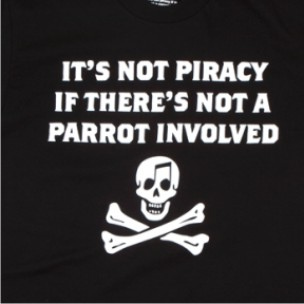
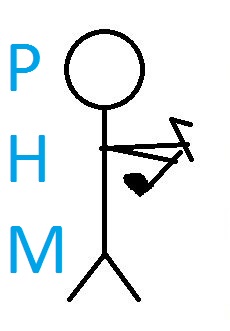
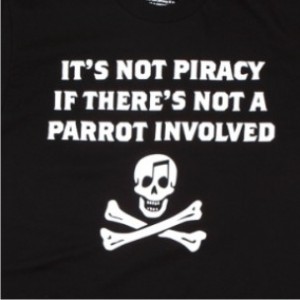
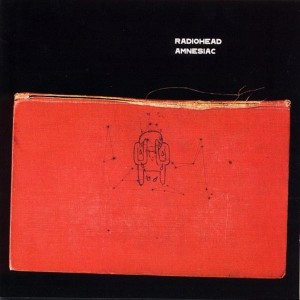













I remember way back in the days of Napster the Barenaked Ladies releasing a “leak” of one of their songs from their upcoming album, but halfway through the track they cut to the guys from the band joking about Napster leaks and reminding people of the album release date.
So detailed! Loved it! Had no idea about the self-leaking and methods of fighting leaks. Keep it up!
@Ian – That’s hilarious. I should’ve interviewed you for this article!
@Kelly – Thanks. Glad you enjoyed it.